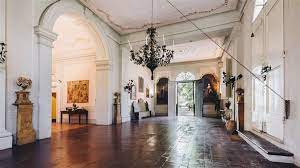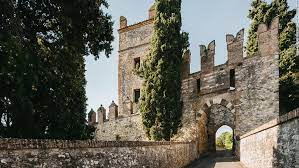Italy: Castle, palace and village on sale for $2 million

Rome: Ever dreamed of owning your own secret citadel in a beautiful region of Italy, wandering along its fortified walls like a monarch surveying their kingdom?
For less than the price of a townhouse in central London or an attic apartment in Rome’s historic center — that dream can now come true.
The medieval castle and hamlet of Serravalle, half-way between the cities of Modena and Bologna in Italy’s northern Emilia Romagna region, is up for sale for 1.9 million euros, or about $2 million.

Already livable and fitted with heating, it requires just minimal fixes — and the price is negotiable.
Set in green rolling hills, the castle comes with a portion of the village, which bears the same name and was once part of its fiefdom, lying at its feet.

What’s up for grabs is the original, overhanging ancient fortification of 1,800 square-meters set at an altitude of 400 meters.
The property comprises the majestic castle built on the ruins of pagan settlements, a three-level 18th century stately palace called Palazzo Boccadiferro, where the current owners occasionally live, a hunting lodge with woodshed, a four-story lookout tower, a stunning panoramic walkway and a lush 14,000 square-meter park.
“Not only is it very convenient, roughly down to 1,000 euros per square meter, it has enormous potential both as a private, silent retreat to unplug in, or as an investment to turn it into a resort,” Paolo Giacopini of Immobiliare Giacopini, the real estate agency handling the sale, told CNN.

“The charm and panorama are matchless, surrounded by vineyards, in a strategic location between the two top cities of Emilia Romagna, a wonderful region which is often wrongly eclipsed by Tuscany when it comes to castles and manors.”
At the moment, the well-maintained estate is rented out for private events and conferences but the current owners, who wish to remain anonymous, are no longer able to cope with running the extensive property.
They live at the castle during summer months, says Giacopini, so it is already inhabitable with heating, kitchen, utilities, fireplaces, several bedrooms and bathrooms. The two-story hunting lodge, built as a rural house, is also heated.
While the castle is immaculately preserved, other parts of the property, such as the lookout tower, built in 1227 and modified in 1523, might require a few fixes.
Lavish Renaissance-style furniture, including paintings, are also potentially on sale.
Giacopini, who takes interested visitors on guided tours, says the vendors are open to offers.
He explains that, given its historical and artistic value, the castle is under the supervision of regional arts authorities who have placed restrictions on radical structural changes such as turning a bathroom into a bedroom, or vice versa.
Some of the historical features add an extra layer of intrigue. A secret underground passage links the tower to the palace and was once used by guards fleeing from enemy attacks.
The passage is cool in summer but freezing cold in winter. Giacopini says one American client who toured the property with him claimed his feet almost froze inside his sneakers.
Serravalle is steeped in history. The fortification has for centuries been at the heart of territorial feuds and battles against invaders and neighboring fiefdoms. Prior to the unification of Italy’s kingdom in 1861, the country was divided into many city states, or comuni, each fighting for supremacy.
In the 12th century the castle was bitterly disputed by Modena and Bologna for its strategic military position. Back in those times, a castle was a small military microcosm that protected a large portion of land, farmers and tenants.
The fortification, built on the ashes of an ancient Roman military outpost called Verabulum, was conquered and destroyed by the Lombard tribes in the eighth century.
After it was rebuilt, legend has it, the castle hosted Charlemagne on his way to Rome to be crowned emperor, accompanied by French troops, in the ninth century,
While it’s quiet and peaceful, the property isn’t totally isolated. The village has some social buzz with 40 residents, a frescoed church, a traditional tavern and a wine museum focusing on local rural life.
A large stone portal emblazoned with a coat of arms and adorned with statues greets visitors at the entrance.
The estate has undergone several upgrades in time. The palace, named after the Boccadiferro (meaning “iron mouth” in Italian) family that ruled it for four centuries, was turned from an ancient covered loggia into a stately noble home. Roughly 1,151 square meters wide, it is the largest portion of the property.
Other than the park of the castello, which is the ancient moat surrounding the hamlet featuring horse chestnut and ash trees, there are also a large hanging garden and courtyard areas ideal for evening drinks and sunset walks.
There is a spooky vibe. According to local lore the castle and estate are haunted by the ghosts of one Boccadiferro lord said to have killed 12 successive wives. Their tormented spirits, wailing and angry, are said to roam the corridors and halls at night searching for vengeance, leaving whiffs of their perfumes in the air.
“The deceased brother of the current owner wrote a research pamphlet on the place’s history and found out that Boccadiferro was so in love with his one wife he had her portrait painted several times in different attire, so it seemed like there were many women but it was always only her,” he says.
Serravalle is perfect for nature lovers as well as those hoping to sample the region’s culinary offerings.
The property is surrounded by farmhouse taverns called agriturismi, serving succulent handmade tagliatelle al ragù and tortellini. There are also vineyards producing premium Pignoletto and DOC wines of the Colli Bolognesi.
Trekking, biking and riding trails unwind in the rural surroundings, while nearby there’s a golf course with 18 holes.





